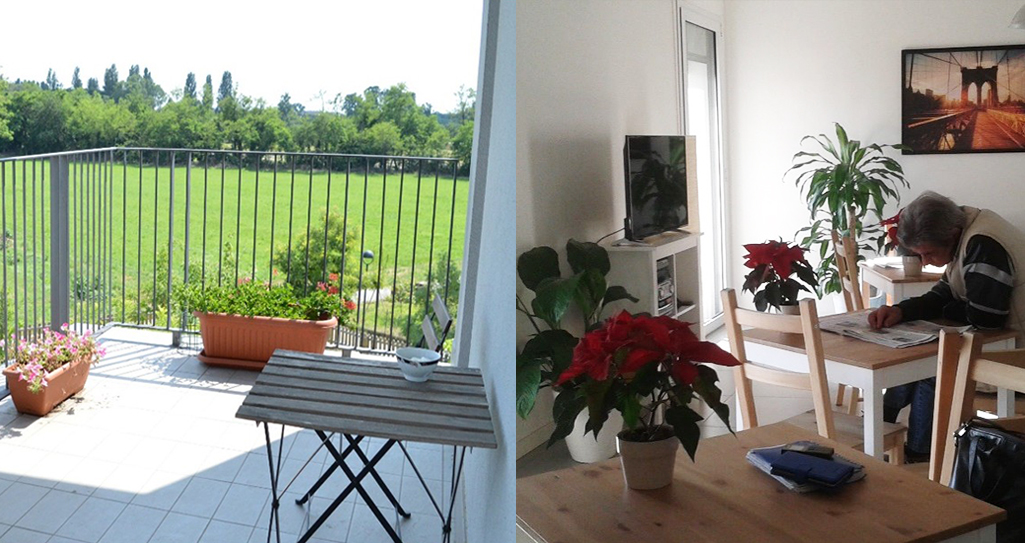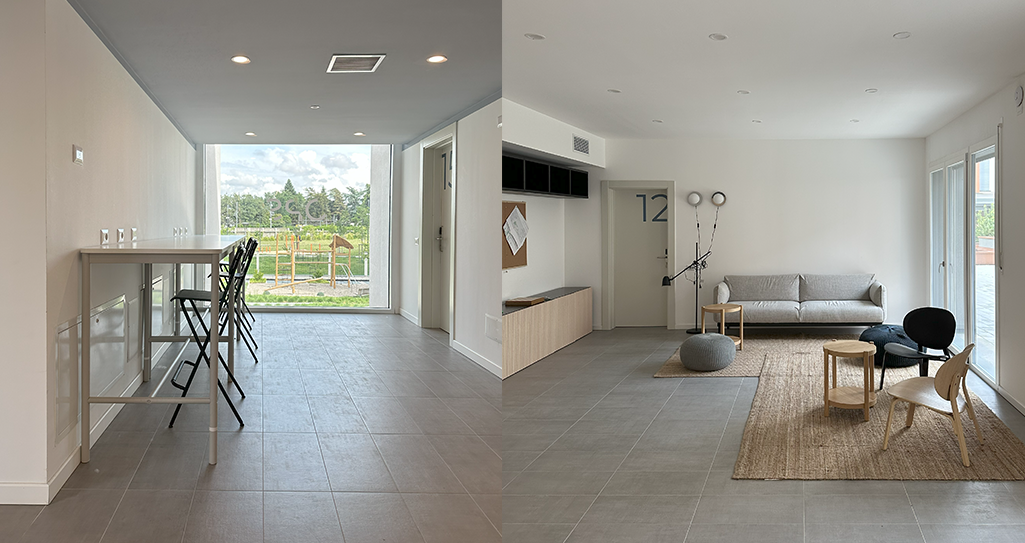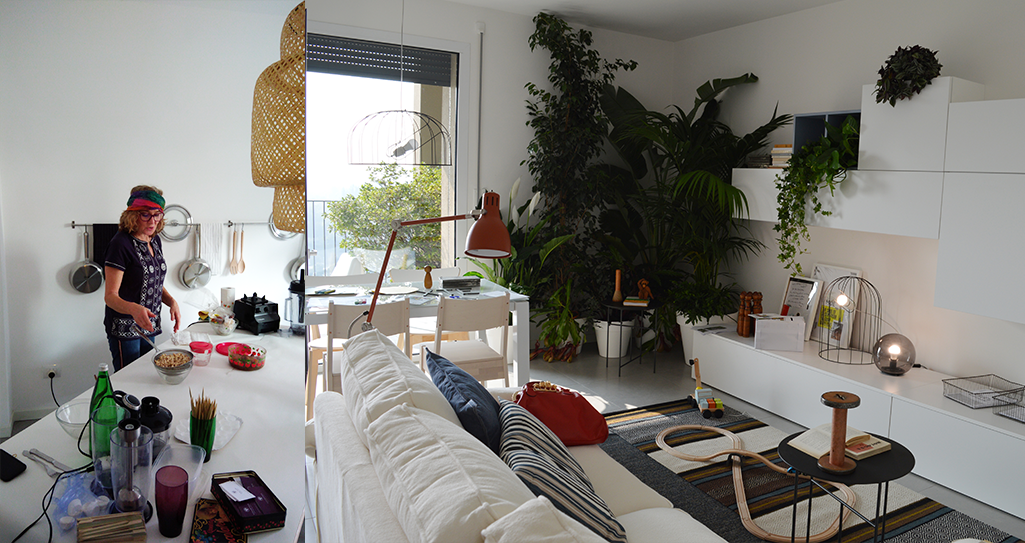GRACE - BORGO ASSISTITO

Grace is the fruit of Fondazione Housing Sociale’s Borgo Assistito concept. It is a social and healthcare service that is a part of the Social Housing intervention at Borgo Sostenibile in Figino, a historic neighborhood to the west of the city of Milan. The service consists of 22 dwellings designated towards light living for seniors with various levels of autonomy, enriched by the presence of spaces that encourage the development of social relationships. In addition, there is also a hub of dwellings designated to the Alzheimer’s Village, together with an integrated day care centre with 30 places that is also open to seniors from the wider city. The project is managed by Equa Cooperativa Sociale, an organisation with consolidated experience in the provision of services aimed at seniors.
The service is organized around a courtyard that overlooks a green area and it connects with the neighbourhood’s new town square. The ground floor includes spaces for the two senior day care hubs, which provide assistance to those residents with disabilities or senile dementia. The open space of the courtyard offers a protected area, for use by the day care centre, which is home to an Alzheimer’s Garden. The layout of the residential units guarantees the presence of both private and shared spaces inside the dwellings, each of which includes bedrooms that offer their residents the possibility to see outside, including those rooms that are used for temporary, respite stays. The ample public lounge spaces (comfortably equipped with armchairs, coffee tables and bookshelves), together with the living room complete with kitchen, foster and encourage conviviality.
The range of services provided here promotes an innovative model of residentiality that is based on the appropriateness of the care and treatment offered in line with the changing requirements of individuals over time, responding not only to the dimension of the need, but also to the social, relational and affective sphere.
In addition, of particular interest is the presence of Habitat Terapeutici (Therapeutic Habitats), cognitive fixtures and fittings which enable the environment to perform a therapeutic function, which started life as an experience of experimental research by the group Lab.I.R.Int inside the Faculty of Design of the Politecnico di Milano, and Equa.
Furthermore, inside Grace can also be found WeMi Figino, a physical and relational space that operates to create connections both inside the neighborhood and with the surrounding area, with the aim of providing concrete solutions to people’s needs. WeMi Figino offers:
– a listening ear for expressed needs and orientation towards the various services that are present within the local territory, with particular attention towards seniors, people with Alzheimer’s and other cognitive decline, and their carers and caregivers;
– shared services in areas of interest that can simplify everyday life, together with opportunities to participate in voluntary work;
– a course of gentle exercise for seniors at Equa’s gym at Grace;
– an internet space “@space” equipped with PCs and the support of an operator available by reservation
SENIOR COHOUSING

The Cohousing project is an innovative residential service that forms part of the Social Housing intervention at Borgo Sostenibile in Figino, located near the historic neighborhood to the west of the city of Milan. The Cohousing project overlooks the neighborhood’s new town square. This residential service consists of 10 studio apartments with a generous provision of common shared spaces, and forms a synergy with the other services present within Borgo Sostenibile. Specifically, the seniors who live in the co-residence can access the services on offer at Grace. The project is managed by Coop Sociale Spazio Aperto Servizi.
The Cohousing spaces, located on the first and second floors of a 3-storey building, provide a close relationship between private living and shared living. The dwellings are distributed along a connecting space on each floor, which also functions as a relational space and as an extension of the dwellings themselves. Each floor features a living room, a fundamental relational space that enables the sharing of activities and interests. The communal terraces, which overlook the countryside, form an outdoor continuation of the living space. There is a communal kitchen available on the first floor.
The Cohousing provides for diverse typologies of user, most of whom are active seniors who are completely autonomous. The active and supportive context makes it possible to contain situations of potential emergency among the vulnerable seniors who live there. Thanks to the accreditation of the managing consortium, a proportion of the dwellings accommodate people experiencing housing difficulties. The aim of the project is to preserve the conditions of well-being and autonomy of these seniors for as long as possible, thus delaying their progress into structures that provide higher-intensity levels of assistance, thanks to the relationships that develop in a collaborative environment.
CO-LIVING AND CO-RESIDENCE

Inside the Social Housing project at Moneta there is space for two new typologies of dwelling: the Co-living and Co-residence models. Beyond the apartments themselves, both dwelling solutions foresee the availability of shared services and spaces, which have been designed to accommodate diverse target inhabitants, and which see the presence of a Social Manager as being the reference point for the community of residents.
The Co-living concept, developed by Fondazione Housing Sociale, proposes a new form of living in shared accommodation, further amplifying the aggregative and community aspect of social housing, which presents itself as an independent structure developed over two levels. In a nutshell, it is a spacious residential unit that is able to accommodate more than 30 guests, consisting of private and independent spaces grouped around fully-equipped communal shared spaces, such as the living room, the kitchens, the large terrace and the laundry room. Those who choose the Co-living lifestyle have the opportunity to share spaces for everyday life while, at the same time, maintaining a private and intimate sphere. The array of apartment sizes on offer, from single rooms to double and triple, makes it possible to satisfy heterogeneous requirements, offering a quality residential solution for medium-term stays, with a flexible duration of between 12 months and 2 years.
The three Co-residences at Moneta are ample apartments that can accommodate between 8-12 people, with shared rooms with ensuite bathroom, in addition to guaranteeing spaces for group socialisation: a large kitchen, a living room, and a communal garden. The people who live there were identified as part of specific residential projects that were developed by third sector entities, selected through the call “Housing Mi.Mo.5” which was promoted by Fondazione Cariplo to pilot inclusive forms of living.
CASA BOTTEGA

Borgo Sostenibile is a place that was also designed for those who need to combine a workspace with their living space, such as freelance professionals, artists, and artisans. Casa Bottega (the “home workshop”) is the solution proposed to match this type of requirement within the Borgo Sostenibile project where, indeed, studio apartments have been designed specifically to integrate domestic spaces with a space that can be used for work-related activities, access to which is possible via an independent entrance.
With Casa Bottega, work becomes truly “smart”, because the convenience of living in Borgo Sostenibile is combined with the possibility to reach your workplace in a few steps, while at the same time keeping your living environment separate from your working environment.
There are nine units designated to this project inside the Borgo Sostenibile complex, and in order to be assigned one of these apartments it is necessary to satisfy certain prerequisites, and to show an interest in the added value offered by being located within a social housing intervention. The people who are the target of this proposal belong to the worlds of culture, design, architecture, creativity and the arts, they are writers, journalists, involved in psychophysical well-being and education, the culinary arts and travel, and artisanship, and all share a keen interest in establishing socio-cultural synergies with the territorial context they live in.



